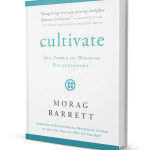

Have you ever been blindsided by a colleague’s words or actions? Or maybe been part of a team that spent more time complaining about others in the business rather than collaborating and solving the business decision at hand?
If you have answered “yes” to either or both questions then you are probably not in an Ally relationship, or even on a team of allies. You have yet to reach what we call the four “yes”s.
In her new book, Cultivate, The Power of Winning Relationships, author Morag Barrett explains what it means to build Ally relationships. Below we provide a summary of the concept and how it works.
There are four critical questions that determine whether you are cultivating winning relationships at work. Are you four “yes”s or four “no”s?
What do we mean? Well in any interaction, we are sizing each other up and asking ourselves (consciously or subconsciously) four questions. The answers to each question determine whether you, or the request you are making of me, is worth my time, interest, trust, and effort. Essentially, they determine whether or not we will have an Ally relationship.
Those four questions are:
Can I count on you?
…This is the reactive perspective. When asked to do something, or a piece of work is delegated to you, you do it and deliver on time, with the required quality of work and professionalism.
Can I depend on you?
…This is the proactive perspective. When you see a need, you step up and do what is required, provide feedback, correct the typo in a document, go out of your way to help us succeed.
If you can answer “yes” to these two questions then your professional relationships will tend to be transactional in nature. Do what you say you are going to do and you will meet expectations. However, you won’t necessarily exceed expectations. In a crisis we may not ask each other for help, or be able to rely on each other. In order to become an Ally, a trusted partner, you need to move the relationship to the next level; this is where the final two questions are critical
Do I care about you?
. . . about your intent, feelings, and emotions? Am I am able to empathize, and do we connect at a personal level?
Do I trust you?
. . . Enough to let my guard down and reveal more of the real me? To take informed risk, to be able to admit to and learn from our mistakes?
Why does cultivating winning relationships matter?
The world of work is a team sport. The biggest team sport any of us get to play. Which means we are dependent on others for our success. We must pay attention to how and when we cultivate professional relationships at work. Unfortunately many people simply focus on getting to “yes” with the first and second questions. In doing so, they are missing a powerful opportunity to cultivate a winning relationship.
Without a positive answer to the third question and more importantly the fourth, you will struggle to achieve an Ally relationship. This is what differentiates an acquaintance from a friend, a coworker from a trusted partner, what we describe as a Supporter, or Rival, to an Ally.
The challenge to you is to take a moment and consider your goals — professional and personal. Who has the ability to help or prevent you from achieving your goals? These are your critical stakeholders, relationships that you should be investing in now to ensure success for both you and for them.
As you think about these four questions and the professional relationships that you identify as critical to your success, remember that this is a two-way street. This is not just about whether you can answer ‘yes’ to each question as you think about that other person. It is also whether they can answer ‘yes’ to all four questions when they think about you.
If you are not sure how they would answer, then sit down with each critical stakeholders and apply the conversation outlined in Cultivate, The Power of Winning Relationships.
 This is an excerpt from Morag Barrett’s new book Cultivate. The Power of Winning Relationships. Morag Barrett is founder and CEO of SkyeTeam, an international HR consulting and leadership development company. Morag’s experience ranges from senior executive coaching to developing leaders and teams across Europe, America and Asia. SkyeTeam works with clients in a range of industries including: Healthcare, Telecoms, Mining, Manufacturing, Engineering, and Technology. Morag has made frequent media stops at The Street.com, American Management Association, Inc.com and SHRM.
This is an excerpt from Morag Barrett’s new book Cultivate. The Power of Winning Relationships. Morag Barrett is founder and CEO of SkyeTeam, an international HR consulting and leadership development company. Morag’s experience ranges from senior executive coaching to developing leaders and teams across Europe, America and Asia. SkyeTeam works with clients in a range of industries including: Healthcare, Telecoms, Mining, Manufacturing, Engineering, and Technology. Morag has made frequent media stops at The Street.com, American Management Association, Inc.com and SHRM.












One comment
Pingback: Critical Questions for Cultivating Winning Rela...